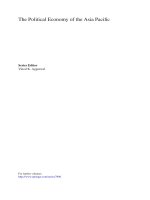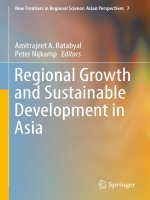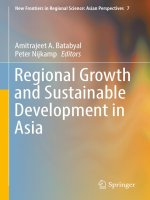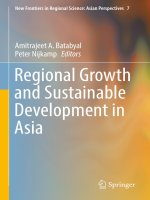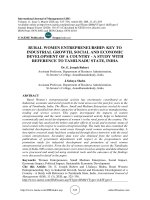Economic growth and economic development 574
Bạn đang xem bản rút gọn của tài liệu. Xem và tải ngay bản đầy đủ của tài liệu tại đây (119.37 KB, 1 trang )
Introduction to Modern Economic Growth
Let us now define the consumption index as
àZ N
ả 1
1
C
ci di
.
0
An identical analysis leads to utility maximizing decisions given by (12.8) and to
the ideal price index
P =
àZ
N
p1
di
i
0
1
ả 1
.
The expression for the semi-indirect utility function is similar
U (C, y) = C + v (y) ,
and using Using the definition of the ideal price index and (12.8), we obtain the
budget constraint as
P C + y ≤ m.
Equation (12.10) then determines y and C. Since the supplier of each variety is
infinitesimal, their prices have no effect on P and C. Consequently, the profitmaximizing pricing decision in (12.12) obtains exactly, and each firm has profits
given by
à
à
ảả
1 1
1
01
N ε−1
ψ m−v
.
π=
εN
εψ
Now using this expression, we can endogenize the entry margin. Imagine, for
example, that there is an infinite number of potential different varieties, and a
particular firm can adopt one of these varieties at some fixed cost µ > 0 and enter
the market. Consequently, as in the Chamberlin’s (1933) model of monopolistic
competition, in equilibrium all varieties will make zero profits because of free entry.
This implies that the following zero-profit condition has to hold for all entrants and
thus for all varieties:
(12.14)
γ−1
γN
Ã
m−v
0−1
Ã
1
N ε−1
εγ
!!
= µ.
As we will see in the next chapter, there is an intimate link between entry by
new products (firms) and technological change. Leaving a detailed discussion of
this connection to the next chapter, here we can ask a simpler question: do the
aggregate demand externalities imply that there is too little entry in a model of
this sort? The answer is not necessarily. While the aggregate demand externalities
560



